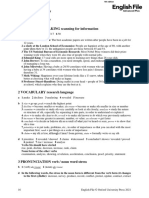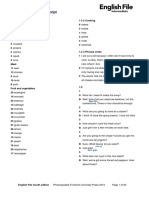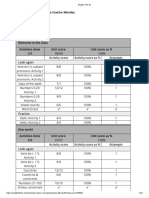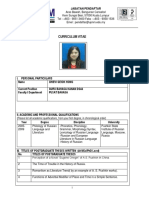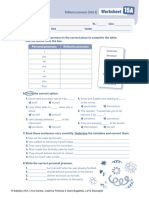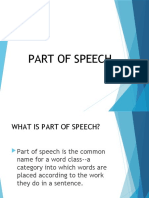EF4e Adv Plus SB Answer Key File 1
EF4e Adv Plus SB Answer Key File 1
Uploaded by
WikiUp MonteriaCopyright:
Available Formats
EF4e Adv Plus SB Answer Key File 1
EF4e Adv Plus SB Answer Key File 1
Uploaded by
WikiUp MonteriaCopyright
Available Formats
Share this document
Did you find this document useful?
Is this content inappropriate?
Copyright:
Available Formats
EF4e Adv Plus SB Answer Key File 1
EF4e Adv Plus SB Answer Key File 1
Uploaded by
WikiUp MonteriaCopyright:
Available Formats
4th edition
Student’s Book Answer Key
1A Motivation and inspiration
1 READING & SPEAKING understanding implicit attitudes and opinions
b 1 B She had a difficult early life, but her one constant thing was singing, and she continued singing
and composing her own music until she met someone who shared her passion.
2 A His experience in African prisons brought him into contact with many people whose crimes
were simply a result of their poverty but who, given the basic healthcare and access to education,
have a better chance of making a success of their lives.
c Suggested answers
Annie Lennox: creativity (composing and singing her own songs), determination (keeping at it
despite not having any support), altruism (she supports women’s rights and AIDS awareness in
Africa).
Alexander McLean: altruism (his work with the African Prisons project), charisma (talking his
way into the prisons), determination and energy (he has succeeded in effecting change in a
challenging context and has continued this work since), people skills (he’s able to get through to
people from a very different culture and background).
d 1E 2C 3F 4D 5B 6A
e 1 from the beginning
2 stopped studying
3 to earn just enough money to be able to buy the things you need
4 persuaded people to allow him to do something (get into a prison)
5 usually, typically
6 set apart from, not included in the main social group
7 how good people say you are
8 fail, make a mistake
2 VOCABULARY vague language
a 1 kind of thing 2 my own stuff
1 Because she doesn’t need to give a complete list of all the places where she lived.
2 Because she is probably referring to various things such as music, lyrics, etc.
Vocabulary Bank vague language
1 AVOIDING UNNECESSARY DETAIL
a 1 stuff 2 bit 3 thing
b 1 thing 2 bit 3 stuff
2 BEING IMPRECISE USING -ISH
1 kind of 2 roughly 3 a bit, quite
3 BEING IMPRECISE ABOUT QUANTITY AND TIME
b 1 around 2 so 3 odd 4 least 5 most 6 something
4 WHATEVER, WHENEVER, ETC.
b 1 Whenever 2 whoever 3 whatever 4 However 5 Whichever 6 Wherever
Meaning: any thing, time, place, person, object, way
1 English File © Oxford University Press 2021
4th edition
Student’s Book Answer Key
4 GRAMMAR modal verbs (1): will, would, should
a Sts should circle the following sentences:
will – 1 would – 3 should – 2
b will
2 refusing
3 expressing annoyance at typical behaviour
4 supposing sth is true
would
1 past habit
2 hypothesizing about the present
4 expressing annoyance at typical behaviour in the past
should
1 a desirable or moral duty
3 a criticism of a past event
4 a formal instruction
Grammar Bank 1A
a 1 I don’t know what’s wrong with my scanner, but it won’t connect to my wi-fi.
2 I think I’d / would find it too stressful.
3 Ben will leave / shouldn’t leave his dirty dishes in the sink…
4 I’m assuming everyone will have done the homework…
5 When I was at primary school, anyone arriving late would be sent to see the headmistress.
6 I should be (shows reasonable expectation) (OR will / shall be – certain prediction) there,
although unfortunately I won’t / shan’t be able to stay long.
7 It’s no use phoning Mimi now – she’ll / will be taking her driving test.
8 I find it astonishing that the old theatre should have been demolished.
9 It’s vital that your password shouldn’t / should not be disclosed to anyone else.
10 I assumed the rules would have been / would be explained to you when you joined the gym.
11 I absolutely won’t apologize.
12 It would seem that your partner is not very well.
13 Most migrating birds will return to the same habitat year after year.
b 1 I won’t generally get up before ten o’clock at weekends nowadays.
2 My teacher suggested (that) I should choose a subject I was passionate about.
3 Of course she would deny screwing up.
4 Thanks for the offer of a lift, but to be honest, I’d sooner walk.
5 I’d have thought / I should think you could afford to buy a car if you start saving up now.
5 PRONUNCIATION contractions
a 1 would is contracted = ’d
2 have is contracted = ’ve
3 both would and have are contracted = ’d’ve
b 1 I will soon have been living here for 20 years.
2 If we had set off earlier, we would not have got caught in the rush hour.
3 They should have known that it would be a disaster.
4 It will be easier to choose the right place if you have already researched online.
5 If I were you, I would accept their offer.
6 You should not have left so late.
2 English File © Oxford University Press 2021
4th edition
Student’s Book Answer Key
6 LISTENING
b 1 cautious
2 wanting the best for you
3 don’t want to be responsible for it
4 different aspect of an idea
5 making you feel pleased
6 don’t have
7 do things to make someone like you
c Suggested answer
If you need to motivate others, it is better to ask them for advice rather than to give them advice.
d 1b 2a 3c 4a
e 1 offering 2 dispensing 3 receiving 4 give 5 seek 6 ask, for
h Kathy
1 She’d been having trouble at work with a junior colleague.
2 From her boss: do what you think is right – it’s not important for everybody to like you.
3 Yes, she thought it was good advice. She has followed the advice throughout her working life.
Emma
1 She was listening to a podcast about body positivity.
2 The podcast: no one is actually looking at you, they’re more concerned about themselves.
3 She doesn’t say whether she has followed it, but she thinks it’s a good thing to live by and she
tries to think like that.
Cecile
1 shopping, looking for a present
2 Her sister: I think you should get the shoes, you’ll wear them loads.
3 Yes, because she’s worn them lots and they worked out cheap.
3 English File © Oxford University Press 2021
4th edition
Student’s Book Answer Key
1B The parent trap
1 READING
b British parents are worried about their children having accidents, e.g. falling into canals; Dutch
parents worry about their children not being independent and self-confident.
c Moya 5 and 8
Zeb 1 and 12
Seegert 4 and 7
Emma 6 and 11
Ben 2 and 10
d Suggested answers
1 Your position in society isn’t so important
2 People don’t worry so much about other people knowing what they are doing
3 It’s a very relaxed way of teaching / teaching style
4 think freedom is more important than money / value freedom more than money
5 you’re not going to have a very rewarding life
6 It’s not considered a negative thing
7 There’s a programme to give students help and advice
8 learning to see both sides of something
2 GRAMMAR noun phrases
b a 1 life 2 having 3 Gathering 4 school 5 self 6 learning
b 1 Using the gerund 2 The first noun describes the second.
Grammar Bank 1B
a 1 ✓ but my is more formal
2 flower vase, kitchen cupboard
3 Not knowing
4 ✓ but The sending of money is more formal
5 missing
6✓
7 ✓ but Harry’s is more formal
8 the disposal of used plastic cups
9 ✓ but the infinitive is more formal
b 1 The introduction of a new system will speed up the process.
2 Their inability to understand what people want means that politicians are increasingly out of
touch.
3 The construction / building of a new library will improve the school’s facilities.
4 The reduction in entrance fees should attract a younger audience.
5 The closure of many small shops will ultimately give consumers less choice.
6 The demand for e-magazines has forced many print magazines to disappear.
7 The monitoring of the use of social media is aimed at protecting young people.
8 The shortage / lack of nurses is resulting in hospital waiting lists getting longer.
4 English File © Oxford University Press 2021
4th edition
Student’s Book Answer Key
3 SPEAKING
a 1 Strict: They were very demanding about studying, but didn’t help with homework. Her father
would be angry if she didn’t do well in exams.
Liberal: Her parents were liberal about playing outside and wouldn’t know where their children
were or wouldn’t mind what time they got back as long as they didn’t miss meals.
2 Her father would be angry if she didn’t do well in exams, and her mother would be disappointed.
Her father tried to impose his tastes on her in music and sport. He was very controlling.
4 LISTENING understanding and assessing the evidence from research
b a Free-range parents: children have lots of freedom with not much supervision
Helicopter parents: parents hover over their children and control their every waking moment
Tiger parents: parents are very demanding and put a lot of pressure on children to achieve
b2
c 1 academic achievement
2 being very engaged with their children and giving them a lot of attention
d 1 strict, supportive 2 obedience 3 second-highest 4 discussing politics 5 focus better
f 1 Negates: ‘the authors of the book say that the evidence doesn’t really support that. …it’s about
finding a balance…’.
2 Supports: They are aiming ‘to shape children’s values and preferences so that the children appear
to be making those choices of their own accord.’
3 Supports: ‘So their children tend to acquire a good work ethic and resilience when they are faced
with challenges…’
4 Negates: ‘However, in the UK in the 1970s, when there was less difference between the lives of
the most and least successful, then, parenting styles were generally more relaxed, which was
appropriate at that time.’
5 Negates: ‘Both authors say they are almost certainly “helicopter” parents.’
6 Supports: ‘…they highlight the importance of having the right parenting style for your
circumstances.’
7 Supports: ‘…but these children, often those from countries where there is a huge focus on
academic achievement, such as Singapore and South Korea, have the most mental health and
youth suicide problems…’
8 Supports: ‘…they may also make the wrong decisions, or miss opportunities because their
parents aren’t involved enough.’
5 VOCABULARY phrasal nouns
a 1 incomes (money people earns from work, investing, etc.)
2 upbringing (the way in which a child is cared for and taught how to behave while it is growing
up)
3 outcome (result or effect)
Vocabulary Bank phrasal nouns
1 PARTICLE FIRST
b 2 in 3 out 4 down 5 after 6 out 7 down 8 after 9 out 10 in 11 up 12 out 13 after 14
out 15 out 16 up 17 down 18 up 19 in
The particle has the main stress.
2 VERB FIRST
5 English File © Oxford University Press 2021
4th edition
Student’s Book Answer Key
b 2 climb 3 come 4 break 5 break 6 turn 7 mix 8 set 9 let 10 write 11 back 12 give 13
hold 14 turn 15 make 16 set 17 break 18 write 19 go 20 stand 21 melt
The verb has the main stress.
6 PRONUNCIATION short and long vowels
a 1a 2b 3a 4b 5b
c 1 /ɪ/ income, system, decide (no other possible spelling)
2 /iː/ obedience, achievement, stream; other spelling = ee (e.g. three)
3 /ʊ/ input, outlook, shouldn’t (no other possible spelling)
4 /uː/ approve, assume, view; other spelling = oo (e.g. food)
5 /ɒ/ equality, hover, knowledge (no other possible spelling)
6 /ɔː/ downpour, supportive, author; other spelling = al (e.g. bald), ough (e.g. thought), aw (e.g.
draw)
7 /ɑː/ demand, harm, laughter (no other possible spelling)
8 /ʌ/ tough, upkeep, accompany (no other possible spelling)
9 /e/ pleasure, intensive, friendship (no other possible spelling)
10 /ɜː/ term, turnout, learning; other spelling = or after w (e.g. world), ir (e.g. dirty)
7 WRITING a discursive essay
ANALYSING A MODEL TEXT
c Paragraph 1 Introduction
Definition of FRP – child-rearing approach where children experience outside world alone
Development of definition – backlash against over-protective parenting
Examples – walking to shops, playing outdoors, taking public transport
Paragraph 2 Advantages of FRP
Point 2 – become adaptable, resourceful, resilient
Point 3 – gain awareness of danger / staying safe
Point 4 – confidence and enthusiasm to explore
Paragraph 3 Disadvantages of FRP
Point 2 – lose self-confidence
Point 3 – real danger from traffic, gangs, criminals
Paragraph 4 Conclusion
Point 2 – world is safer place
Final statement – as long as not exposed to too much danger,
FRP helps prepare children for adulthood
d 1 punctuation > well-adjusted
2 register > children
3 preposition > engage in
4 singular / plural agreement > there are
5 wrong collocation > greater awareness
6 spelling > accusations
7 incorrect word (L1 interference) > safeguarding
8 article > free-range parenting
9 tense > is becoming
10 gerund / infinitive > develop
11 word order > and thus provide valuable preparation
USEFUL LANGUAGE
f Clearly, there are several advantages…
Advocates of this approach argue that…
6 English File © Oxford University Press 2021
4th edition
Student’s Book Answer Key
A further potential problem is…
But perhaps the most compelling argument is…
Arguably, …
g Sts should have crossed out these words:
1 about is incorrect. Register: as to is more formal than of.
2 excited is incorrect. Connotation: lively suggests vigorous discussion; heated implies a level of
anger.
3 plusses of is incorrect. Register: arguments in favour of is slightly more formal than advantages
to.
4 put emphasis on is incorrect. No difference.
5 deep-seated is incorrect. No difference.
6 Believers is incorrect. Meaning: Advocates means people in favour; Opponents means people
against.
7 factual is incorrect. Register: the case is more formal than true.
8 Experts have investigated is incorrect. Meaning: Statistics are a specific numerical type of
evidence.
9 particular belief is incorrect. No difference.
10 According to me is incorrect. Meaning: I personally believe that stresses that it is a personal
opinion much more strongly than It seems to me that.
8 THE CONVERSATION
a 1 Syinat 2 Tim 3 Devika
b 1 Because his father was a bit distant with him.
2 Because they weren’t brought up in the digital age.
3 Because her mother always treated her as an equal.
4 Because she and her cousin were brought up in strict households.
d 1 to an extent 2 a little bit 3 that 4 definitely 5 more of a 6 quite 7 a very different
7 English File © Oxford University Press 2021
4th edition
Student’s Book Answer Key
1 Revise and Check
USE OF ENGLISH
a 2 has been a dramatic increase
3 Would you rather go
4 has been a (significant) downturn
5 there will be many job losses
6 should have phoned
7 were 200 or so
8 outlook for next week
9 would / ’d sooner drive than
10 printer won’t turn on
11 keeps / will keep phoning me
12 would have been driving
b 2 should 3 thing 4 being 5 will / should 6 self 7 downs 8 wouldn’t
READING
1B 2D 3A 4C
8 English File © Oxford University Press 2021
You might also like
- Pre-Intermedi̇ate Tests and AnswersDocument163 pagesPre-Intermedi̇ate Tests and Answersemrcnglmz2100% (5)
- Quick Test6 English File Intermediate AkDocument1 pageQuick Test6 English File Intermediate AkWikiUp Monteria100% (1)
- Quick Test 4 English File Intermediate AkDocument1 pageQuick Test 4 English File Intermediate AkWikiUp Monteria0% (1)
- EF4e C1.1 SB AnswerKeyDocument78 pagesEF4e C1.1 SB AnswerKeyCelia SF100% (3)
- SB Answer Key File 1Document6 pagesSB Answer Key File 1Changes School of EnglishNo ratings yet
- English File 4th Edition Advanced Studentx 27s Book CompressDocument177 pagesEnglish File 4th Edition Advanced Studentx 27s Book CompressCris100% (1)
- EF3e Intplus Quicktest 01 PDFDocument2 pagesEF3e Intplus Quicktest 01 PDFmariajo100% (3)
- Revise and Check Units 3 & 4Document1 pageRevise and Check Units 3 & 4jfernandezpomarNo ratings yet
- EF4e Adv Plus SB Answer Key File 7Document8 pagesEF4e Adv Plus SB Answer Key File 7WikiUp MonteriaNo ratings yet
- EF4e Adv Plus SB Answer Key File 8Document8 pagesEF4e Adv Plus SB Answer Key File 8WikiUp MonteriaNo ratings yet
- Quick Test6 English File IntermediateDocument3 pagesQuick Test6 English File IntermediateWikiUp Monteria100% (1)
- English File Answer Key - PDF - Sibling - StepfamilyDocument2 pagesEnglish File Answer Key - PDF - Sibling - Stepfamilyjose miguel badal alter0% (1)
- Grammar AnswersDocument1 pageGrammar AnswersF DNo ratings yet
- S VCRDocument16 pagesS VCRPriscila JodasNo ratings yet
- EF4e B2.1 SB ScriptDocument76 pagesEF4e B2.1 SB Scriptsther31No ratings yet
- File 1 1A: Workbook AudioscriptDocument7 pagesFile 1 1A: Workbook Audioscriptzurita69100% (1)
- Communicative: Gerund or Infinitive?Document1 pageCommunicative: Gerund or Infinitive?PressCall AcademyNo ratings yet
- EF4e Int Quicktest 04Document3 pagesEF4e Int Quicktest 04Maria Luisa Serrano Barba0% (2)
- Business English WritingDocument254 pagesBusiness English WritingNhy Yến92% (12)
- 2.2 Writing A Research TitleDocument23 pages2.2 Writing A Research TitleTotep ReyesNo ratings yet
- Sample Pages Catalogue: ElementaryDocument16 pagesSample Pages Catalogue: Elementarysoundes0% (1)
- EF4e Adv Plus SB Answer Key File 3Document8 pagesEF4e Adv Plus SB Answer Key File 3WikiUp MonteriaNo ratings yet
- 2A Do You Remember ?: 1 READING Expressing A Response To A Creative Text / LiteratureDocument7 pages2A Do You Remember ?: 1 READING Expressing A Response To A Creative Text / LiteratureНаталья УлановаNo ratings yet
- EF4e Adv Plus SB Answer Key File 2Document7 pagesEF4e Adv Plus SB Answer Key File 2WikiUp MonteriaNo ratings yet
- EF4e Adv Plus SB Answer Key File 6Document7 pagesEF4e Adv Plus SB Answer Key File 6WikiUp MonteriaNo ratings yet
- EnglishFile4e Advanced TG PCM Grammar 2ADocument1 pageEnglishFile4e Advanced TG PCM Grammar 2ADr. Abdullah Al-ShamiNo ratings yet
- 9A Pet Hates: 1 READING Understanding Complex LanguageDocument10 pages9A Pet Hates: 1 READING Understanding Complex LanguageНаталья УлановаNo ratings yet
- EF4e AdvPlus EndtestaDocument11 pagesEF4e AdvPlus EndtestaВалерия ЗазалитиноваNo ratings yet
- English File 4e Advanced SB Answer Key File 10Document6 pagesEnglish File 4e Advanced SB Answer Key File 10Наталья УлановаNo ratings yet
- Colloquial English Answer Key Units 2&3Document2 pagesColloquial English Answer Key Units 2&3jfernandezpomarNo ratings yet
- English File 4e Advanced 1 Grammar & Vocabulary - ExamDocument10 pagesEnglish File 4e Advanced 1 Grammar & Vocabulary - ExamAron amado Santillan RodríguezNo ratings yet
- EF4e Adv Plus SB Answer Key File 4Document9 pagesEF4e Adv Plus SB Answer Key File 4WikiUp MonteriaNo ratings yet
- EF4e C1.1 How To Guide For TestsDocument1 pageEF4e C1.1 How To Guide For TestsEwelinaNo ratings yet
- EnglishFile4e Intermediate Plus TG PCM Grammar AnswersDocument2 pagesEnglishFile4e Intermediate Plus TG PCM Grammar AnswersEddie Baldwin100% (1)
- English File 4e Advanced SB Answer Key File 3Document8 pagesEnglish File 4e Advanced SB Answer Key File 3Mirela UrusciucNo ratings yet
- 4 Answer Key A Grammar, Vocabulary, and PronunciationDocument6 pages4 Answer Key A Grammar, Vocabulary, and PronunciationM9094No ratings yet
- Mini Grammar: 1B The The + ComparativesDocument6 pagesMini Grammar: 1B The The + ComparativesManuel Sanchez Gonzalez100% (1)
- EF4e AdvPlus Filetest 3a AKDocument3 pagesEF4e AdvPlus Filetest 3a AKKasia Zapiór100% (1)
- English File 4e Advanced SB Answer Key File 8Document8 pagesEnglish File 4e Advanced SB Answer Key File 8Mirela UrusciucNo ratings yet
- EnglishFile4e Advanced TG PCM Grammar 3ADocument1 pageEnglishFile4e Advanced TG PCM Grammar 3AКарина ПогосянNo ratings yet
- Nef Upper Filetest 1bDocument4 pagesNef Upper Filetest 1bm1hai1No ratings yet
- 2B English File B2Document7 pages2B English File B2Lucía Pérez CasillasNo ratings yet
- AudioscriptDocument19 pagesAudioscriptRebeca BabugliaNo ratings yet
- EF4e B2.2 SB ScriptDocument68 pagesEF4e B2.2 SB ScriptgarridoeNo ratings yet
- Nef Adv Progresstest 4-7 Ans KeyDocument5 pagesNef Adv Progresstest 4-7 Ans KeyeliNo ratings yet
- English File 4e Upperintermediate Teachers Guide-161Document1 pageEnglish File 4e Upperintermediate Teachers Guide-161Emi Sciaini0% (1)
- English File 4e Int SB ScriptDocument69 pagesEnglish File 4e Int SB ScriptNguyen PhucNo ratings yet
- A002953 EF4e DG B1-B1+ TRB AKDocument8 pagesA002953 EF4e DG B1-B1+ TRB AKdonncha geraghty100% (1)
- HW5e Elem VideoWorksheet U10 WebDocument2 pagesHW5e Elem VideoWorksheet U10 Webrachid asseffarNo ratings yet
- English File: Answer KeyDocument4 pagesEnglish File: Answer KeyPatinéNo ratings yet
- Our Lifestyles Are Less Healthy Than Our GrandparentsDocument1 pageOur Lifestyles Are Less Healthy Than Our GrandparentsАлена КалиушкоNo ratings yet
- EF4e B2.2 Video ScriptDocument33 pagesEF4e B2.2 Video ScriptALBATECNo ratings yet
- EF4e Beg Progtest 7 12A AKDocument4 pagesEF4e Beg Progtest 7 12A AKNelly Lea100% (1)
- NEW ENGLISH FILE INTERMEDIATE Tests-страницы-68Document1 pageNEW ENGLISH FILE INTERMEDIATE Tests-страницы-68tetiakoiNo ratings yet
- End-Of-Course Test Answer Key A: GrammarDocument8 pagesEnd-Of-Course Test Answer Key A: GrammarBilol QobilovNo ratings yet
- EnglishDocument7 pagesEnglishjeffersonbaltodano1No ratings yet
- 4b A Risky BusinnessDocument17 pages4b A Risky BusinnessGuadalupe George PolvoNo ratings yet
- EF4e Intplus AK Filetest 5bDocument3 pagesEF4e Intplus AK Filetest 5bjeanneramazanovaNo ratings yet
- Me Not To Tell Her PlayingDocument6 pagesMe Not To Tell Her Playingمطليات الالماسNo ratings yet
- Personality Tests: Can They Identify The Real You?Document2 pagesPersonality Tests: Can They Identify The Real You?anasinhacheNo ratings yet
- English File 4eDocument24 pagesEnglish File 4eMiguel UsecheNo ratings yet
- EF4e Elem Progresstest 1 6bDocument8 pagesEF4e Elem Progresstest 1 6bJane KimNo ratings yet
- EF Preint 12A C What Had HappenedDocument1 pageEF Preint 12A C What Had HappenedMichelle Montvitt100% (1)
- Writing Lessons 1-8 Answer KeyDocument3 pagesWriting Lessons 1-8 Answer KeyMAMNo ratings yet
- 2a - Spend or SaveDocument5 pages2a - Spend or SaveOk English100% (1)
- FAMILY гп2Document8 pagesFAMILY гп2NastiaNo ratings yet
- SAMSEN Pre Test 051120SpecialEngDocument14 pagesSAMSEN Pre Test 051120SpecialEngครูปัณณภัสร์ สวัสดิ์ภัสร์No ratings yet
- Unit 1 A Family Affair (Workbook) PDFDocument8 pagesUnit 1 A Family Affair (Workbook) PDFHolgado Malaga0% (2)
- Application To Harvard. Get Hold of HerDocument6 pagesApplication To Harvard. Get Hold of HerAlbertoXavierNo ratings yet
- EF4e Adv Plus TG PCM Grammar 5ADocument1 pageEF4e Adv Plus TG PCM Grammar 5AWikiUp MonteriaNo ratings yet
- Quick Test6 English File Intermediate AkDocument1 pageQuick Test6 English File Intermediate AkWikiUp MonteriaNo ratings yet
- Grammar 16 TensesDocument5 pagesGrammar 16 Tensesbrigitta aprillyaNo ratings yet
- Bud PowellDocument2 pagesBud Powellmarkiball100% (2)
- Bronze Age Writing: Source - WikipediaDocument3 pagesBronze Age Writing: Source - WikipediaWolfMensch1216No ratings yet
- Book 01 Lesson 01 To 03-1Document34 pagesBook 01 Lesson 01 To 03-1aabaki1983No ratings yet
- UGE 1 Practice Set Worksheet 3making InferenceDocument9 pagesUGE 1 Practice Set Worksheet 3making InferenceALBERT ALGONES100% (1)
- Eng201 Short Notes by Amir For Midterm-1Document8 pagesEng201 Short Notes by Amir For Midterm-1mg8898344No ratings yet
- Art of Oral InterpretationDocument23 pagesArt of Oral InterpretationSerrano Sison MarionNo ratings yet
- Unit (3) - PoetryDocument9 pagesUnit (3) - PoetryMangriya DivyanshuNo ratings yet
- BCCA Revised Syllabus 210920Document8 pagesBCCA Revised Syllabus 210920ishamohadikar15No ratings yet
- TA8 REVIEW, MID-TERM 1, 2021: Test 2Document7 pagesTA8 REVIEW, MID-TERM 1, 2021: Test 2thaoNo ratings yet
- Literal Vs Liberal What Is A Faithful inDocument34 pagesLiteral Vs Liberal What Is A Faithful inMisarabbit NguyenNo ratings yet
- Unit 2 - Lesson 2Document3 pagesUnit 2 - Lesson 2Pei Cheng WuNo ratings yet
- Quot English Quot Ingilis Dili Asas Xarici Dil Fanni Uzra 10 Cu Sinif Ucun Darslik 1539604664 369Document219 pagesQuot English Quot Ingilis Dili Asas Xarici Dil Fanni Uzra 10 Cu Sinif Ucun Darslik 1539604664 369East ofWestNo ratings yet
- CV ChristyDocument8 pagesCV ChristySUNNYWAY CONSTRUCTIONNo ratings yet
- Becaue of Winn Dixie RWNDocument11 pagesBecaue of Winn Dixie RWNRicky FavelaNo ratings yet
- CEFR Correlation by Skill: SpeakingDocument16 pagesCEFR Correlation by Skill: SpeakingLeila HannaneNo ratings yet
- Dialect EngDocument11 pagesDialect EngkeylimikadzeNo ratings yet
- All About Me Reading Comprehension Exercises 87934Document1 pageAll About Me Reading Comprehension Exercises 87934KATHERINE GIOVANNA IGLESIAS PEREZNo ratings yet
- Worksheet: Re Exive Pronouns (Unit 6)Document1 pageWorksheet: Re Exive Pronouns (Unit 6)Isabel Isabel RibeiroNo ratings yet
- Translation Studies-Translating Poetry-Rahma Yulia SyahfitriDocument9 pagesTranslation Studies-Translating Poetry-Rahma Yulia SyahfitriRahma Yulia SyahfitriNo ratings yet
- Interrogative SentenceDocument4 pagesInterrogative SentenceIan BernalteNo ratings yet
- How To Write EmailsDocument9 pagesHow To Write EmailsalilathNo ratings yet
- Al-Ani - Arabic Phonology: An Acoustical and Physiological Investigation (1970)Document106 pagesAl-Ani - Arabic Phonology: An Acoustical and Physiological Investigation (1970)Allan Bomhard50% (2)
- Noun Verb Adjective AdverbDocument16 pagesNoun Verb Adjective AdverbDaffaNo ratings yet
- Speech Competition RubricDocument1 pageSpeech Competition RubricMeily50% (2)





















